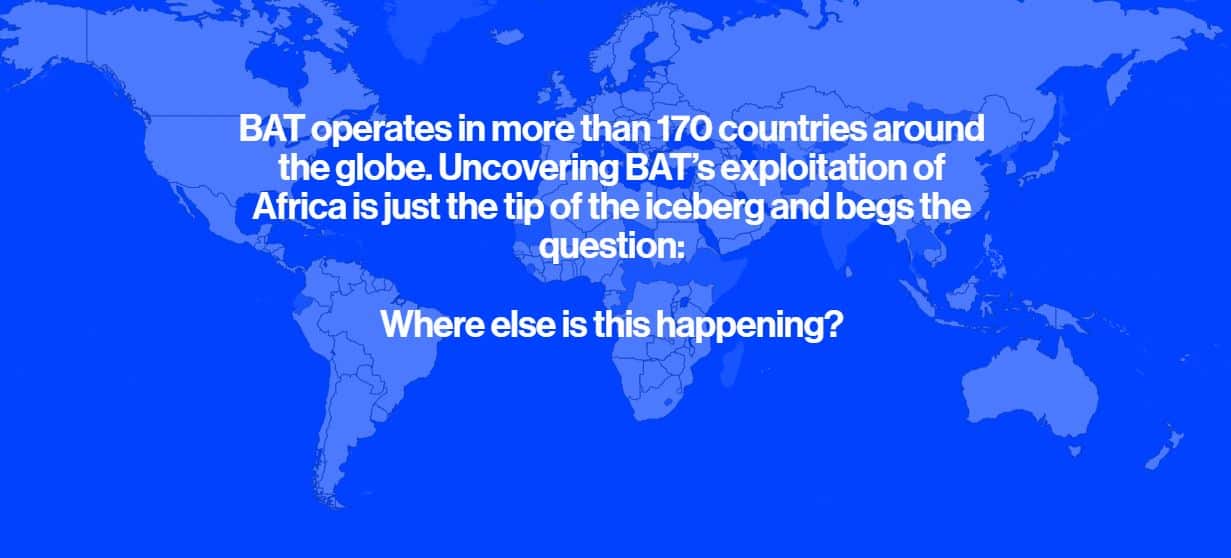Analysis of leaked industry documents and court affidavits suggests British American Tobacco was engaged in a range of crimes.

Exterior view on the headquarters of British American Tobacco (BAT) in London, Britain, 17 January 2017. Picture: EPA/FACUNDO ARRIZABALAGA
British American Tobacco Uncovered
Global tobacco industry watchdog Stopping Tobacco Organizations and Products (STOP) has released a damning report into one of the world’s largest tobacco companies.
The report, British American Tobacco (BAT) in South Africa: Any Means Necessary, and a further investigation by BBC Panorama: Dirty Secrets of the Cigarette Business, detail how BAT used potentially questionable payments to influence tobacco control policies and undermine competitors.
The company allegedly paid varying amounts to politicians, journalists, competitors’ staff and others.
Analysis of leaked industry documents and court affidavits suggests BAT was engaged in possibly illegal informant networks, state capture, and potentially smuggling its own products in Africa.
With its young and growing population, Africa is one of the only regions in the world where cigarette sales are still increasing. BAT’s dubious activities have helped keep consumers addicted to its deadly products.
ALSO READ: Local authorities don’t BAT an eye at complaints of tobacco skulduggery
Unsurprisingly, BAT has denied the allegations.
Anti-tobacco groups are now lobbying the government to take the report seriously and implement the Control of Tobacco Products and Electronic Delivery Systems Bill, published in 2018, or to process the bill to Cabinet by the end of 2021.
The National Council Against Smoking (NCAS) has called on BAT South Africa (BATSA) to be investigated by the Hawks and the Special Investigating Unit (SIU) over allegations of bribery and illegal surveillance on competitors, among other alleged infringements.
“It is not surprising that BAT is once again entangled in such accusations,” said Dr Sharon Nyatsanza, project and communications manager at NCAS.
“It’s clear that BAT has resorted to desperate measures to keep selling their products,” said Professor Pamela Naidoo, CEO of the Heart and Stroke Foundation South Africa (HSFSA).
ALSO READ: British American Tobacco SA concerned about surge in cigarette robberies

Lorraine Govender, national manager of health promotion for the Cancer Association of South Africa, said: “Tobacco is responsible for over 16 types of cancers. The devastating effects of cancer in South Africa is picking up speed.
Govender said the rate of death from cancer among men and women in all racial groups and many types of cancers, including lung cancer, continued to rise.
“We are certainly witnessing the aftermath of BAT’s alleged dubious activities. The cost of their unscrupulous activities should not only be measured in rands and cents, but also the irreplaceable loss of human lives that forever alters communities,” said Govender.
Zanele Mthembu, public health policy and development consultant, says African governments should take the BAT reports seriously, particularly in South Africa, where BATSA holds more than 70% of the market share and smoking rates and related deaths remain high.
About one in five people smoke cigarettes, according to the South Africa Demographic and Health Survey.
“Every year, tobacco-related diseases kill about 42,100 people in South Africa. These diseases cost the South African economy R42 billion each year. This is money which government could rather use for the socio-economic development,” said Mthembu.
ALSO READ: British American Tobacco to take legal action over cigarette ban
“We implore our government to save South Africa by passing the long-awaited Control of Tobacco Products and Electronic Delivery Systems Bill, published in 2018 – or to at least process the Bill to Cabinet by the end of 2021,” said Mthembu.
Professor Lekan Ayo-Yusuf, director of the Africa Centre for Tobacco Industry Monitoring and Policy Research (ATIM) at Sefako Makgatho Health Sciences University, said: “The tobacco industry’s political influence is consistently identified as a key barrier to effective implementation of the WHO FCTC [World Health Organization Framework Convention on Tobacco Control] in several African countries.”
Dr Catherine Egbe of the alcohol, tobacco and other Drugs research unit at the South African Medical Research Council, said the tobacco industry’s actions continued to stifle progress in reducing tobacco use.
“Better tobacco control could reduce the power tobacco companies such as BAT have to infringe on the rights of vulnerable populations, and we need strong and persistent government action to protect current and future generations from the devastating consequences of tobacco.”
Sanele Zulu, chairperson of the South African Tobacco-Free Youth Forum, said, “We are very disheartened to see the depth of the allegations against BAT. We are even more determined to fight for the Tobacco Control Bill to be passed to ensure that lives are saved.”
(Compiled by Narissa Subramoney)





